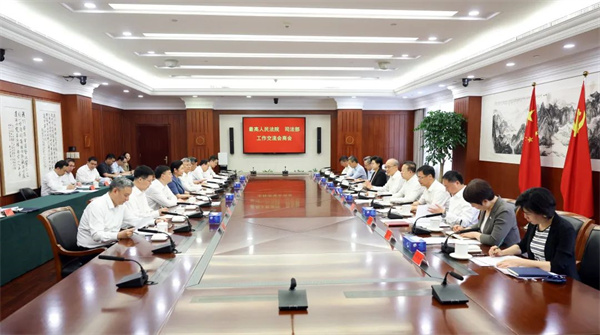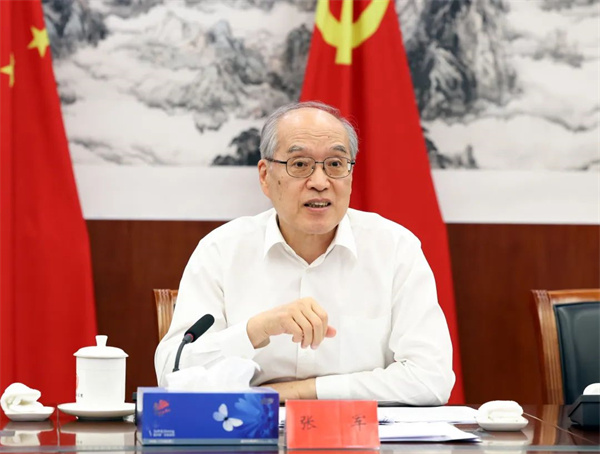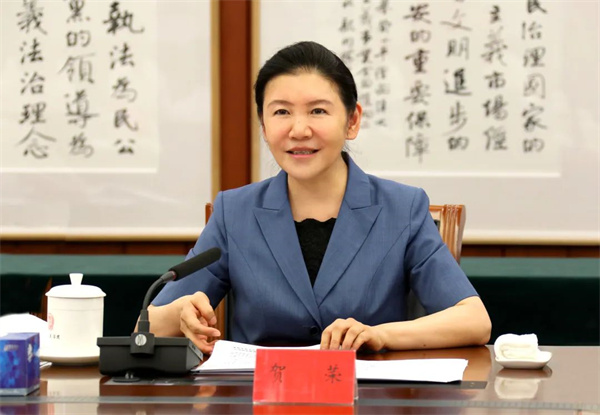SPC, MOJ hold work exchange and consultation meeting

On June 5, the Supreme People's Court (SPC) and the Ministry of Justice (MOJ) hold the second work exchange and consultation meeting at the SPC. [Photo/court.gov.cn]
On June 5, the Supreme People's Court (SPC) and the Ministry of Justice (MOJ) held the second work exchange and consultation meeting at the SPC. President of the SPC Zhang Jun and Minister of Justice He Rong attended and addressed the meeting.
Since the establishment of the work exchange and consultation mechanism in August last year, judicial adjudicatory organs and judicial administrative organs at all levels have maintained close exchanges and robust collaboration. The first consultation meeting between the SPC and the MOJ concluded with meeting minutes identifying 28 topics, of which 21 have made significant progress and four have been completed.
This time, both parties identified 24 specific topics, focusing on strengthening the coordination between administrative reconsideration and administrative adjudication and enhancing cooperation on the rule of law in the Guangdong-Hong Kong-Macao Greater Bay Area (GBA).
He Xiaorong, vice-president of the SPC, Wang Shumei, a standing member of the SPC's adjudication committee, Wang Zhenjiang and Hu Weilie, vice-ministers of justice, briefed the meeting participants on relevant work.
Chief judges from the Case Filing Division, the 4th Civil Division and Administrative Division of the SPC and leading officials from the SPC's General Office and Research Office, as well as those from the MOJ's General Office, Bureau of Administrative Reconsideration and Response, Bureau of People's Participation and Promotion of the Rule of Law, Bureau of Public Legal Services Administration, and Bureau of Lawyers' Work, conducted in-depth discussions and exchanged views based on their surveys and practical work.

Zhang Jun, president of the Supreme People's Court (SPC), attends and addresses the second work exchange and consultation meeting between the SPC and the Ministry of Justice. [Photo/court.gov.cn]

Minister of Justice He Rong attends and addresses the second work exchange and consultation meeting between the Supreme People's Court and the Ministry of Justice. [Photo/court.gov.cn]
Zhang pointed out that the work exchange and consultation meeting between judicial adjudicatory organs and judicial administrative organs is an effective measure to implement Xi Jinping Thought on the Rule of Law through active fulfillment of duties, and to integrate the political perspective with the rule of law in specific work. After nearly a year of exploration, the task list for this meeting is more detailed in its objectives and more practical in its requirements, making it more conducive to accurately solving problems and promoting work.
Moving forward, efforts should be made to ensure the effective implementation of outcomes achieved at the meeting with clear timetables and roadmaps, and through consultations and communication on a regular basis, he noted.
He emphasized adherence to the absolute leadership of the Communist Party of China (CPC), focusing on implementing the decisions and plans of the CPC Central Committee, promoting key tasks such as the linking between administrative reconsideration and litigation from a high standpoint, and serving the development of the GBA.
Zhang called for consistently adhering to the people-centered principle, and ensuring the effective implementation of various measures that benefit the people with the focus on substantially resolving administrative disputes and providing more convenient and efficient judicial services to residents of the GBA in a bid to enhance people's sense of gain in fairness and justice.
Judicial adjudicatory organs and judicial administrative organs should steadfastly follow the path of socialist rule of law with Chinese characteristics, perform their respective functions, coordinate with and check one another, fully leverage the greatest political advantage of the Party's leadership, and jointly shoulder the important responsibility of promoting comprehensive law-based governance, Zhang added.
He Rong noted that since the establishment of the mechanism of exchange and consultation meetings between the SPC and the MOJ last year, the two sides have deepened cooperation and achieved practical outcomes, which fully highlights the significant advantage of China’s socialist rule of law.
She stressed the need to deeply implement Xi Jinping Thought on the Rule of Law, adopt targeted measures to address the key and challenging problems faced by the judicial administrative and adjudication work, effectively implement the newly revised Administrative Reconsideration Law, strengthen information sharing and joint training on administrative reconsideration and administrative adjudication, form a joint force in substantially resolving administrative disputes and promoting law-based administration, and fully leverage the role of administrative reconsideration as the main channel for resolving administrative disputes.
The justice minister also noted that practical progress should be made in the construction of international commercial arbitration centers in the GBA, the building of an effective dispute resolution mechanism that integrates arbitration, mediation, and litigation, and the establishment of first-class international arbitration institutions and law firms, in a bid to support the Hong Kong and Macao special administrative regions in better integrating themselves into the country's overall development.
Additionally, she emphasized the need to continuously strengthen the cultivation of qualified lawyers, intensify the protection of lawyers’ practicing rights, enhance the precision and effectiveness of industry regulation, promote law-based, honest and standardized practice of lawyers, and guide lawyers to steadfastly follow the path of socialist rule of law with Chinese characteristics.
The meeting participants also exchanged views on the key areas and specific measures for next-step cooperation, reached consensuses on many topics, and urged detailed and effective implementation of them.







